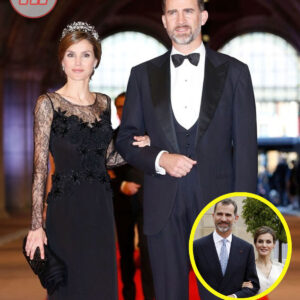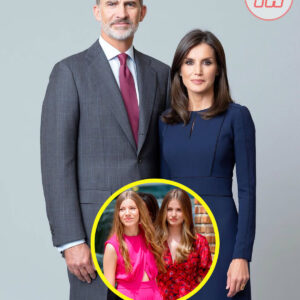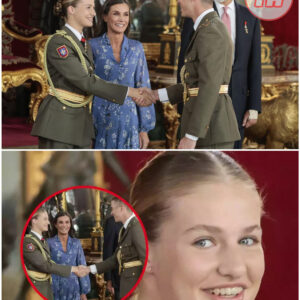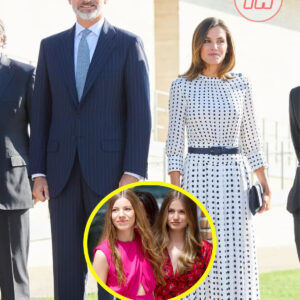Queen Sofía Rejected by Granddaughter at Princess of Asturias Awards Ceremony
The Princess of Asturias Awards ceremony, traditionally a moment of celebration and unity within the Spanish royal family, took an unexpected turn as Queen Sofía was reportedly rejected by her granddaughter.
The incident, which unfolded in front of dignitaries and a global audience, has sparked intense speculation and analysis regarding the dynamics within the royal household and the implications for the monarchy’s public image.
The event, held annually to honor individuals and organizations for their outstanding achievements in various fields, became the center of attention due to the notable absence of harmony between Queen Sofía and her granddaughter, the Princess of Asturias. Witnesses described a tense moment during which Queen Sofía attempted to approach her granddaughter for what appeared to be a customary exchange or gesture of affection.
However, the Princess of Asturias reportedly rebuffed her grandmother’s advances, leading to an uncomfortable and highly scrutinized interaction.
Sources close to the royal family revealed that the rift between Queen Sofía and her granddaughter has been brewing for some time, exacerbated by differences in opinions and lifestyles. Queen Sofía, known for her traditionalist views and adherence to protocol, has allegedly clashed with the Princess of Asturias over matters of personal freedom and modernization within the monarchy. The generational gap and evolving expectations of royalty in a contemporary context have further contributed to tensions between the two.
The rejection at the Princess of Asturias Awards ceremony has underscored deeper divisions within the Spanish royal family, prompting widespread discussion about the future direction of the monarchy and the role of its younger members.

Analysts and royal watchers have debated whether this incident signals a broader shift in power dynamics or simply reflects isolated personal disagreements amplified by public scrutiny.
In response to the incident, representatives from the royal palace have attempted to downplay the significance of the interaction, characterizing it as a momentary misunderstanding rather than a fundamental rift within the family.
However, the public and media have remained captivated by the symbolic implications of the rejection, viewing it as a reflection of broader societal changes and expectations regarding familial relationships and public appearances.
The fallout from the Princess of Asturias Awards ceremony has also raised questions about the challenges of maintaining traditional royal protocols in an era increasingly shaped by social media and public transparency.
The scrutiny faced by members of the royal family, particularly the younger generation, underscores the complexities of balancing personal autonomy with institutional responsibilities and public expectations.
Observers have pointed out that incidents such as these highlight the evolving role of royalty in contemporary society, where traditional expectations of duty and decorum are juxtaposed with demands for transparency and authenticity.
The rejection by the Princess of Asturias, seen by many as a symbolic gesture of independence and assertion of personal boundaries, has prompted reflections on the changing nature of monarchy in Spain and beyond.

As discussions continue within both royal circles and the broader public sphere, the Princess of Asturias Awards ceremony serves as a poignant reminder of the complexities inherent in navigating familial relationships and public duties under intense scrutiny.
The incident involving Queen Sofía and her granddaughter has ignited debates about generational shifts, personal freedoms, and the enduring relevance of monarchy in the 21st century.
In conclusion, the rejection of Queen Sofía by her granddaughter at the Princess of Asturias Awards ceremony has sparked significant reflection and debate about the future of the Spanish monarchy.
Beyond the immediate incident, it has raised profound questions about generational dynamics, personal autonomy, and the evolving role of royalty in a modern society increasingly shaped by shifting values and expectations.
News
El coste de la monarquía española: Los reyes Letizia ganan una enorme cantidad de dinero cada año
La Zarzuela aplicó una subida del 3% respecto al presupuesto del 2022, tanto a las retribuciones de los Reyes como las del resto de funcionarios. El costo de la monarquía española: el Rey cobró más 250.000 euros y la reina…
La infanta Sofía y Leonor desencadenan un problema de celos que parte a Zarzuela en dos
No todos ven bien en Zarzuela que Leonor y Sofía hayan adquirido un fuerte protagonismo En los últimos meses, la familia real española ha sido escenario de un conflicto que ha sacudido las bases de Zarzuela. La revelación explosiva hecha por Jaime del Burgo ha intensificado la…
En qué se gasta el dinero la Familia Real: 4,1 millones en personal, 550.000 en teléfono y 60.000 en libros y prensa
Uno de los temas que más polémica genera en la política española es la cuestión monárquica. No solo por los escándalos asociados a la institución, sino también por el dinero que reciben anualmente. Como dispone el artículo 65.1 de la Constitución,…
CONOCE AL CADETE QUE CASI BESA A LA PRINCESA LEONOR
Conoce al Cadete que Casi Besa a la Princesa Leonor: Un Incidente que Conmocionó a España Recientemente, España ha sido testigo de un incidente que ha capturado la atención de medios y público por igual: un cadete de la Academia…
La princesa Leonor se une a Sofía para la foto ‘Pero por orden de la reina Letizia’
La Princesa Leonor se Une a Sofía para la Foto: “Pero por Orden de la Reina Letizia” La fotografía de la Princesa Leonor y la Infanta Sofía, capturada recientemente en un evento oficial, ha generado una avalancha de especulaciones y…
El ultra lujoso estilo de vida de la Princesa Leonor de España
El Ultra Lujoso Estilo de Vida de la Princesa Leonor de España: Un Vistazo a la Vida de la Heredera La Princesa Leonor de Asturias, hija mayor del Rey Felipe VI y la Reina Letizia, no solo es la heredera…
End of content
No more pages to load











